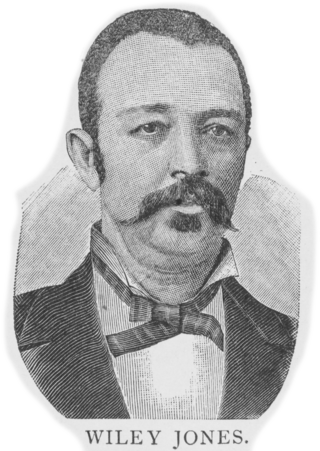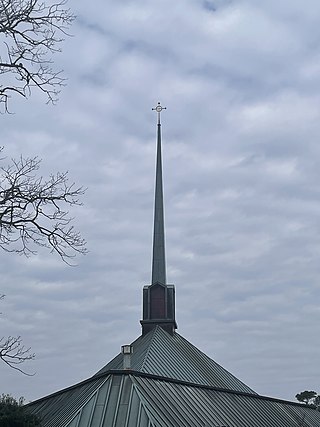
Altheimer is a city in Plum Bayou Township, Jefferson County, Arkansas. It is situated on the Union Pacific Railway, 11 miles (18 km) northeast of Pine Bluff. As of the 2010 census it had a population of 984, down from 1,192 at the 2000 census. As of 2018 the estimated population was 829.

Pine Bluff is the 10th most populous city in the state of Arkansas and the county seat of Jefferson County. It is the principal city of the Pine Bluff Metropolitan Statistical Area and part of the Little Rock-North Little Rock-Pine Bluff Combined Statistical Area. The population of the city was 41,253 in the 2020 census.

For people with the surname, see Redfield (surname).

North Little Rock is a city in Pulaski County, Arkansas, United States. It is the twin city of Little Rock. The population was 64,591 at the 2020 census, making it the 7th most populous city in Arkansas.

The University of Arkansas at Pine Bluff (UAPB) is a public historically black university in Pine Bluff, Arkansas. Founded in 1873, it is the second oldest public college or university in Arkansas. It was one of about 180 "normal schools" established by state governments in the 19th century to train teachers for the rapidly growing public common schools. It was one of 23 established to train African Americans to teach in segregated schools. Some of the 180 closed but most steadily expanded their role and became state colleges in the early 20th century and state universities in the late 20th century. UAPB is part of the University of Arkansas System and Thurgood Marshall College Fund.

The Diocese of Little Rock is a Latin Church ecclesiastical jurisdiction or diocese of the Catholic Church for Arkansas in the United States. It is a suffragan diocese in the ecclesiastical province of the metropolitan Archdiocese of Oklahoma City.
Pine Bluff School District No. 3 (PBSD) is a school district headquartered in Pine Bluff, Arkansas. The district has 10 schools with over 3,800 students and 500 employees.
St. Joseph Catholic School was a private, Roman Catholic grade 5-12 middle and high school in Pine Bluff, Arkansas.
Dollarway School District No. 2 (DSD) was a school district headquartered in Pine Bluff, Arkansas, United States. With over 1,600 students and employing more than 300 educators and staff, the district had three active school campuses at the end of its life.

Andrew J. Byrne was an Irish-born American Catholic priest, who became the first bishop of the Diocese of Little Rock in Arkansas from 1844 until his death in 1862.

Little Rock is the capital and most populous city of the U.S. state of Arkansas. The city's population was 204,405 in 2022. The six-county Little Rock metropolitan area is the 81st-most populous in the United States with 748,031 residents according to the 2020 census.

John Baptist Morris was an American prelate of the Roman Catholic Church. He served as bishop of the Diocese of Little Rock in Arkansas from 1907 until his death.

Edward Mary Fitzgerald was an Irish-born American prelate of the Roman Catholic Church. He served as bishop of the Diocese of Little Rock in Arkansas from 1867 until his death in 1907.
Harold Robert Perry, S.V.D. was an African-American clergyman of the Catholic Church. An auxiliary bishop of the Archdiocese of New Orleans for more than twenty years beginning in 1966, he was the first openly African-American Catholic bishop, the second overall, and the first since 1875.
New Gascony, also known as Barraqué Landing, is an unincorporated community in Jefferson county, Arkansas, 13 miles (21 km) west of Pine Bluff, the county seat. It was founded by Antoine Barraqué, a 19th-century landowner, on November 29, 1832, and named for the Gascony region of France.
Dollarway High School was a comprehensive public high school in northwest Pine Bluff, Arkansas that serves grades 9 through 12. It was one of three public high schools in Pine Bluff and was a part of the Pine Bluff School District effective July 1, 2021. Prior to that point it was the only high school managed by the Dollarway School District. Within the state, the school is often referred to as Pine Bluff Dollarway. It closed as of fall 2023.

Walter "Wiley" Jones was a businessman in Pine Bluff, Arkansas, who was one of the wealthiest African-Americans in his state. He owned the first streetcar company in Pine Bluff and a park in the city which housed the fairgrounds. A devotee of horse racing, he owned stables and a race track on the park grounds. He also owned a saloon. He was active in civic affairs and was an advocate for civil rights.
Ridgway Christian School (RCS) was a private K–12 Christian school in Pine Bluff, Arkansas. Pine Bluff First Assembly of God is the school's parent church. The 30-acre (12 ha) middle and high school campus was owned by the Pine Bluff Educational Endowment (PBEE); This campus was known as Ridgway Christian High School (RCHS).
Friendship Public Charter School, Inc. is a network of charter schools in Arkansas. Friendship Education Foundation has an office in Little Rock, Arkansas and another office in Washington, DC.

Westover Hills Presbyterian Church is a congregation of the Presbyterian Church (USA) in Little Rock, AR. Westover Hills is notable for its history in the Civil Rights struggle in Little Rock and the work of its then pastor Richard B. Hardie, Jr. in support of integration of the Little Rock Public Schools. The congregation continues to take public stances on many controversial issues including racial reconciliation, prisoners’ rights, and advocacy for LGBTQIA+ members of the community.












